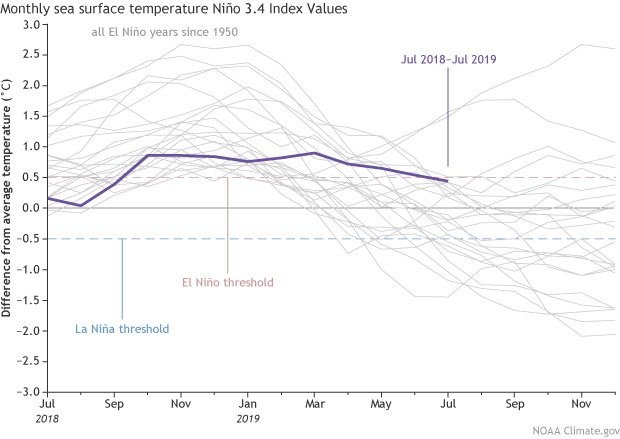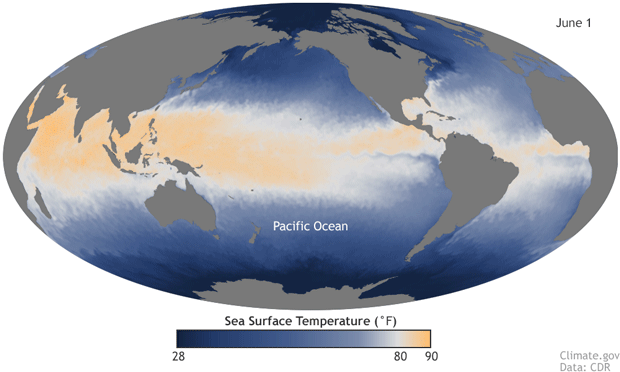The following Article indicates that as of August this year the negative effects of the El Nino may have retreated to normal.
"August 2019 El Niño Update: Stick a fork in it
August 8, 2019
What’s on our plate?
The July Niño3.4 index, our primary index for monitoring ENSO, was 0.4°C above the long-term average, falling below the El Niño threshold of 0.5°C for the first time since last September. In addition, tropical atmospheric conditions have trended toward neutral, as the cloudiness and rainfall over the Pacific were near average over the past month. The trade winds also have been near average lately, indicating that Walker circulation, which weakens during El Niño, has shown signs of rebounding.
Monthly sea surface temperature in the Niño 3.4 region of the
tropical Pacific for 2018–19 (purple line) and all other El Niño years since 1950. Climate.gov graph based on ERSSTv5 temperature data.
Based on these latest indicators from the tropical ocean and atmosphere, NOAA forecasters have declared that El Niño has ended and neutral conditions have returned. Does a return to neutral mean that average weather conditions are expected to prevail around the globe? As Michelle pointed out a couple years ago, the answer is an emphatic NO. A return to neutral means that we will not get that predictable influence from El Niño or La Niña, but the atmosphere is certainly capable of wild swings without a push from either influence. Basically, ENSO-neutral means that the job of seasonal forecasters gets a bit tougher because we do not have that ENSO influence that we potentially can predict several months in advance (in a probabilistic form).
A change to neutral could also impact the Atlantic hurricane season, which typically ramps up this time of year and peaks in early-to-mid September. El Niño tends to produce hostile conditions for Atlantic hurricanes, as explained more thoroughly in Dr. Phil Klotzbach’s guest post, so a return to neutral means that we will not get a decisive push from El Niño to the Atlantic. The updated NOAA Atlantic Hurricane Season Outlook is now available, so be sure to check how these changing ENSO conditions and other drivers are impacting the Atlantic hurricane season.

Sea surface temperature from June 1 through July 27, 2019. The region
of cool water in the tropical eastern Pacific, called the eastern
Pacific cold tongue, is clearly visible along the Equator, surrounded by
warmer waters to the north and south. The wavy features along the
northern and southern borders between the cold tongue and the warmer
waters are tropical instability waves. The waves on the north side are
clearer in part due to the stronger temperature gradient on that side of
the cold tongue. Map by NOAA Climate.gov from CDR data.

2 comments:
Maybe our weather will normaise.
Is the equatorial warming dure to undersea volcanic action?
I have not researched the source of the warming of the area (mid pacific on in the equatorial area) however it seems logical that volcanic sea bed activity could play a part.
Post a Comment